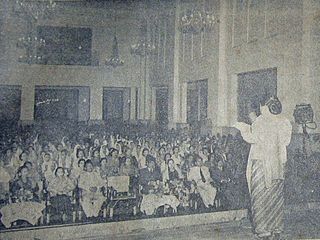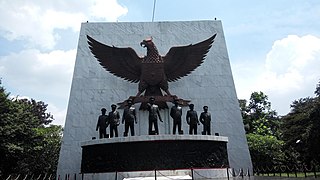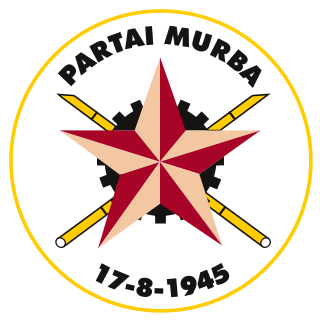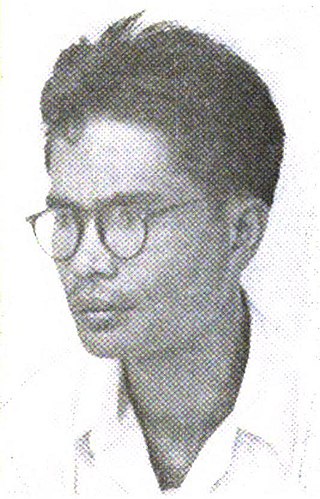Related Research Articles
The Abangan are Javanese people who are Muslims and practice a much more syncretic version of Islam than the more orthodox santri. The term, apparently derived from the Javanese language word for red, abang, was first developed by Clifford Geertz, but the meaning has since shifted. Abangan are more inclined to follow a local system of beliefs called adat and Kebatinan than pure Sharia. Their belief system integrates Hinduism, Buddhism and animism. However, some scholars hold that what has classically been viewed as Indonesian variance from Islam is often a part of that faith in other countries. For example, Martin van Bruinessen notes similarity between adat and historical practice among Muslims in Egypt as described by Edward Lane.

The Communist Party of Indonesia was a communist party in the Dutch East Indies and later Indonesia. It was the largest non-ruling communist party in the world before its violent disbandment in 1965. The party had two million members in the 1955 elections, with 16 percent of the national vote and almost 30 percent of the vote in East Java. During most of the period immediately following the Indonesian Independence until the eradication of the PKI in 1965, it was a legal party operating openly in the country.

Semaun, also spelled Semaoen, was the first chairman of the Communist Party of Indonesia (PKI) and was a leader of the Semarang branch of the Sarekat Islam.
Peasants Front of Indonesia was a peasant mass organisation connected to the Communist Party of Indonesia (PKI). BTI was founded 25 November 1945. The previous peasant organisation of PKI had been the Peasants Union formed in 1945. Its final general chairman was Asmu, the PKI's main agricultural analyst, who was appointed to the position in July 1962. The organization struggled for land reform, and was suppressed along with PKI in 1965.

Gerwani was a women's organization founded as Gerwis in Semarang, Central Java, on 4 June 1950.

The Thirtieth of September Movement was a self-proclaimed organization of Indonesian National Armed Forces members. In the early hours of 1 October 1965, they assassinated six Indonesian Army generals in an abortive coup d'état. Later that morning, the organisation declared that it was in control of media and communication outlets and had taken President Sukarno under its protection. By the end of the day, the coup attempt had failed in Jakarta. Meanwhile, in central Java there was an attempt to take control over an army division and several cities. By the time this rebellion was put down, two more senior officers were dead.

Lukman Njoto or Njoto was a senior national leader of the Communist Party of Indonesia (PKI), who joined the party shortly after the country's declaration of independence, and was killed following the 1965 coup attempt.

The Madiun Affair, known locally as the Communist Party of Indonesia rebellion of 1948, was an armed conflict between the government of the self-proclaimed Republic of Indonesia and the left-wing opposition group Front Demokrasi Rakyat during the Indonesian National Revolution. The conflict began on September 18, 1948, in Madiun, East Java, and ended three months later when most FDR leaders and members were detained and executed by TNI forces.

The Acoma Party was a communist party in Indonesia. It evolved out of the Young Communist Force. Acoma was converted into Partai Acoma on 8 August 1952. Acoma/Partai Acoma was led by Ibnu Parna.

Murba Party was a 'national communist' political party in Indonesia. The party was founded by Tan Malaka, Chairul Saleh, Sukarni and Adam Malik in 1948. The history of the party was largely intertwined with that of the powerful Communist Party of Indonesia (PKI). Initially relations between PKI and the Murba Party were fluid, but gradually the two parties developed into each other's arch-enemies. The Murba Party continued to exist under the New Order, but was merged into the Indonesian Democratic Party in 1973.
Sarbupri, short for Sarekat Buruh Perkebunan Republik Indonesia, was a trade union of plantation estate workers in Indonesia. As of the late 1950s, it was the largest trade union in the country. Sarbupri was affiliated to the trade union centre SOBSI, which was linked to the Communist Party of Indonesia.

The Central All-Indonesian Workers Organization was the largest trade union federation in Indonesia. Founded during the period of the country's independence in the late 1940s, the federation grew rapidly in the 1950s. It was initially formed with loose connections to the Communist Party of Indonesia (PKI) and with members from other parties, but over time, the PKI became dominant in the organisation. With the introduction of President Sukarno's guided democracy in the late 1950s, SOBSI was formally recognised and given a place in the national decision-making structures. In the 1960s, SOBSI came into conflict with the Army, whose officers controlled the country's state enterprises. After the 1965 coup that subsequently produced Suharto's New Order regime, SOBSI was declared illegal, its members killed and imprisoned and most of the leadership executed.
Muhamad Samikidin was an Indonesian politician. He served as the First Secretary of the Aceh Committee of the Communist Party of Indonesia (PKI).
Review of Indonesia was an English-language monthly magazine published by the Communist Party of Indonesia (PKI). The magazine existed between 1954 and 1960. It was initially known as Monthly Review. It was launched in mid-1954. Monthly Review was mimeographed, but once it was relaunched as Review of Indonesia in January 1957 it was printed and illustrated.

PKI dan Perwakilan was a quarterly journal published from Djakarta by the Communist Party of Indonesia (PKI) 1956–1964. The publication was initially known as PKI dan DPR and was founded in June 1956. The name was changed to PKI dan Perwakilan after the local council elections of 1957. The magazine sought to provide information about the activities of the party inside parliament and local councils.

Wikana was an Indonesian minister and independence leader. He was one of the youths who forced Sukarno and Hatta to declare independence immediately after the surrender of the Japanese. He was the first Indonesian Minister of Youth and Sport. He was a member of the Indonesian Communist Party. Sometime after the 1965 coup d'état attempt, he was arrested and went missing, it is supposed that he was one of the assassinated in the Indonesian mass killings of 1965–66.

Bintang Merah was a magazine of the Communist Party of Indonesia which published in Jakarta from 1945 to 1948 and again from 1950 to 1965. It described itself as a magazine of Marxist-Leninist politics and theory.
The Indonesia Party, better known as Partindo, was a nationalist political party in Indonesia that existed before independence and was revived in 1957 as a leftist party.
Asmu, whose birth name was Asmoe Tjiptodarsono, was a leader, theoretician, and chief agricultural expert of the Indonesian Communist Party (PKI) and head of the Communist-affiliated Peasants Front of Indonesia in the mid-1960s. He was killed during the Indonesian mass killings of 1965–66.

Peris Pardede (1918–1982) was an Indonesian politician who was a key figure in the Communist Party of Indonesia during the Sukarno era. He held various roles, including editor of the party magazine Bintang Merah, representative of the party in the Provisional House of Representatives and the House of Representatives throughout the 1950s and early 1960s, and Politburo candidate in 1965. After the party was banned in 1965, he was put on trial and spent his final decades as a political prisoner of the Suharto regime.
References
- 1 2 3 4 5 Hindley 1964 , pp. xvi, 82, 91
- ↑ Guide to Microforms in Print. K. G. Saur Verlag GmbH. 2006. p. 682.
- ↑ Corsino, MacArthur F. (1982). A Communist Revolutionary Movement As an International State-Actor: The Case of the PKI-Aidit. Hong Kong u.a: Maruzen Asia. p. 101.
- ↑ American University (1965). Area Handbook for Indonesia. Washington: U.S. Govt. Print. Off. p. 557.
- ↑ Hindley 1964, p. 324.
Works cited
- Hindley, Donald (1964). The Communist Party of Indonesia, 1951-1963. Berkeley: University of California Press.